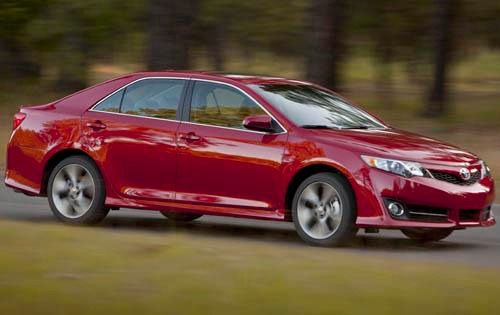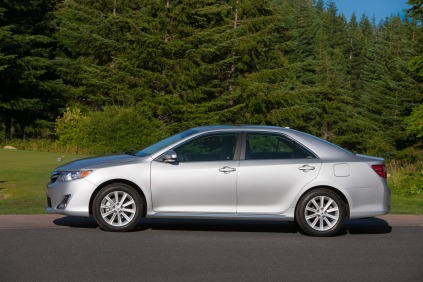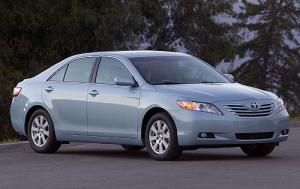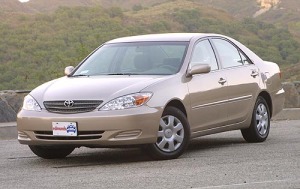In today's extremely high-priced used car market, many shoppers are now looking for "older" models that have aged well as a way to save significant dollars. The Toyota Camry is certainly one of these models, making them a viable and definitely more economical option at this time.

We're specifically referring to the 5th, 6th and 7th generation Camrys, those produced from 2002 through 2017. That's where the largest savings are. And well below average annual mileage candidates can still be found out there.
And generally, these generations are known for their reliability. Toyota has a strong reputation for producing durable and dependable vehicles, and the Camry is one of its most prime examples.
These generations continue to be praised for their longevity, low maintenance costs, and solid performance, which have contributed to their reputation for reliability among both drivers and automotive experts alike.
In fact, history has proven in the real world that a well-maintained Camry will last in the 200,000 - 300,000 mile range ... with the key being "well-maintained". The others need to be avoided.
So here, we'll review the features of several older Camry generations, as well as possible mechanical issues to be on the lookout for because even a Camry can and will experience them, and the overall pros and cons worth consideration.
Older Toyota Camry Overviews
The Camry was first introduced in 1983, having been specifically designed for the U.S market. With its front-wheel-drive (replacing the rear-wheel-drive Corona), the Camry went on to virtually takeover the midsize family sedan segment. Car buyers were won over by its comfortable ride, high build quality and ongoing reliability.
Originally produced with a four-cylinder engine only, a V6 engine was soon added. Increases in size and features also grew over time. And the Camry become so popular that in the late '80's Toyota began manufacturing them in Georgetown, Kentucky.
2012 - 2017 Camry
The seventh-generation Camry made its debut for the 2012 model year and was produced through 2017.

This Camry sports a sharper exterior design with more angular lines and a more aggressive overall look than earlier versions. Inside, the layout and materials quality has been upgraded and design tweaks have produced more passenger room even though the vehicle hasn't changed in size.
There's also a new Display Audio system that integrates audio, infotainment and navigation systems.
And in terms of performance, revisions to the engines and suspension have improved handling and made it more fun to drive. At the same time, fuel economy was also increased to where the four-cylinder became the most fuel-efficient in its class while the V6 gets 30 mpg on the highway.
7th Generation Mechanical Problem Watchlist
While the 7th generation Toyota Camry is generally considered reliable, there have been some reported issues that owners have experienced. These issues might not affect every vehicle, but should be checked before buying:
Transmission Issues: Some owners reported problems with the automatic transmission, including rough shifting or hesitation, especially in earlier models of this generation.
Power Steering Problems: A few instances of power steering problems, such as a noisy power steering pump or a loss of power steering assistance, have been reported by some owners.
Oil Consumption: There have been reports of excessive oil consumption in certain models, leading to the need for more frequent oil top-ups between regular services.
Braking System: Some owners have experienced issues with premature brake wear, requiring more frequent replacement of brake pads and rotors.
You May Also Like:
Easily Negotiating The Lowest Price
Do This For The Best Trade-In Price
The Truth About Wholesale And Trade-in Values
How To Get The Lowest Rate Car Loan
Electrical and Infotainment System Glitches: Instances of electrical issues and occasional glitches in the infotainment system have been reported, including problems with the touchscreen or connectivity features.
Suspension and Noise Complaints: A few owners have reported suspension-related issues, such as noises from the suspension system or premature wear of suspension components.
It's important to note that while these issues have been reported by some owners, the overall reliability of the 7th generation Camry remains quite high. Also, regular maintenance and timely repairs may have helped mitigate potential problems.
2007 - 2011 Camry
The sixth generation Toyota Camry debuted for the 2007 model year and carried through the 2011 model. Even the base Camry had become well-equipped with standard features such as full power accessories, stability control, antilock brakes (ABS), cruise control, air conditioning, a tilt/telescoping steering wheel and a 6-speaker CD sound system.

Opting for an SE model adds a sport-tuned suspension, while the smoother-driving XLE adds upscale features such as leather upholstery (in the V6), dual-zone automatic climate control, a premium sound system, a power passenger seat and reclining rear seats.
Three different engines power this version of the Camry. The base model is equipped with a 169-horsepower 2.5-liter inline-4. A 179-horsepower version of the same engine powers the SE, while there's also a powerful optional 3.5-liter V6 that produces 268-horsepower and 248-pound-feet of torque that can be found in all models except the base.
Older Camry shoppers should note that for 2010, the base engine was increased to 2.5-liters and power was increased to 169-horses. The SE also got a power boost to 179-hp. In addition, all transmissions, whether manual or automatic, were upgraded to six speeds.
This Camry generation was spacious, well-equipped, smooth riding, fairly fuel-efficient and had top crash test scores. Other top choices during this time period would include the Ford Fusion as well as the Nissan Altima.
There's also a Camry Hybrid gas-electric model that produces 192-horsepower and has an EPA gas mileage estimate of 33 mpg city and 34 mpg on the highway.
6th Generation Mechanical Problem Watchlist
In the 6th generation Camry, several issues were reported by some owners, despite its overall reputation for reliability. Here are some of the reported problems that should be checked prior to purchase:
Transmission Concerns: Similar to the 7th generation, there were occasional reports of transmission issues, including rough shifting or hesitation, particularly in earlier models.

Oil Consumption: Some owners reported higher-than-normal oil consumption between services, which could indicate issues with the engine.
Power Steering Problems: Instances of power steering pump noise or failure, leading to a loss of power steering assistance, were reported by a few owners.
Brake Wear: Premature brake wear, requiring more frequent replacement of brake pads and rotors, was a concern for some drivers.
Suspension and Noise Issues: Similar to the 7th gen, there were reports of suspension-related problems, including unusual noises or premature wear of suspension components.
Electrical and Interior Problems: Occasional electrical glitches and issues with interior features, such as the infotainment system or power windows, were reported by some owners.
2002 - 2006 Camry
The earlier fifth generation Camry was produced during the 2002 to 2006 model years. Again, this Toyota Camry was a roomy and comfortable sedan offered with either an inline-4 or V6 engine.
While many of these Camrys were still equipped with most of the latest safety features such as stability control and side curtain airbags, the base Camry did not get standard antilock brakes until 2005.

There were also three available engines. The 2.4-liter four-cylinder generated 154-horsepower and was coupled to either a 5-speed manual transmission or a 5-speed automatic (4-speed pre 2005).
While this engine is found satisfying by most buyers, Camry LE and XLE models from this generation can also be found with a 3.0-liter V6 that delivers 190-horsepower (18 less prior to 2004).
And in 2004, a 210-horsepower 3.3-liter V6 was introduced for the Camry SE. Again, all V6 Camrys were automatic transmission only.
5th Generation Mechanical Problem Watchlist
The fifth generation Camry, while again generally quite reliable, had a few reported issues that some owners encountered:
Engine Oil Sludge: Certain models in this generation were known for potential engine oil sludge buildup if not properly maintained.
Transmission Problems: Some owners reported transmission-related issues, such as rough shifting or failure to engage gears smoothly, particularly in automatic transmissions.
Suspension and Steering Concerns: Instances of premature wear of suspension components or complaints about steering system noises were reported by some drivers.
Brake Wear: Similar to later generations, some drivers experienced faster-than-expected wear of brake pads and rotors.
Electrical and Interior Issues: Occasional problems with electrical components, such as malfunctioning power windows or interior lights, were reported by a small number of owners.
Overall Pros And Cons Of An Older Toyota Camry
Older Camry Pros:
Reliability: Toyota Camrys are known for their long-term reliability, so even older models may still have a lot of life left if properly maintained.
Low Maintenance Costs: Generally, Toyotas have lower maintenance costs compared to some other brands, thanks to their durable build and widespread availability of parts.
More Car Buying Tips:
Is It A Good Time To Buy A New Toyota Right Now?
This One Tip Will Save Thousands On Car Insurance
Understanding Wholesale And Trade-in Values
Fuel Efficiency: Older Camry models often offer decent fuel efficiency, which can be a plus with rising fuel costs.
Resale Value: While buying an older car might not seem like an investment, Toyotas tend to retain their value relatively well compared to other brands, which can be beneficial if you decide to sell it later.
Older Camry Cons:
Higher Mileage and Wear: Depending on the age and mileage of the car, it might require more frequent repairs or replacements due to wear and tear of various parts.
Safety Features: Older models might lack some of the advanced safety features found in newer vehicles. This includes things like advanced airbag systems, collision avoidance tech, or lane departure warnings.
Fuel Efficiency Compared to Modern Cars: While older Camrys are fuel-efficient, newer models tend to have more advanced engine technology that can offer better gas mileage.
Limited Features: Older models might not have the latest tech features, such as advanced infotainment systems, smartphone integration, or advanced driver-assistance systems.
When buying an older Camry, a thorough inspection by a trusted mechanic and checking the vehicle's maintenance history can help determine its condition. Overall, while an older Camry may lack some modern features, it could still provide reliable transportation at a more affordable price compared to newer vehicles in today's high-priced market.
 By Josh Rosenberg
By Josh Rosenberg